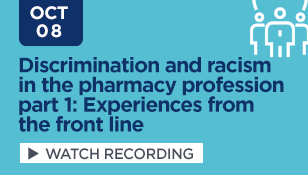Fall Webinar Series

Missed the live stream? Check out the recordings!
Note that any reference to accreditation in the recordings refers to CEUs earned from attending the live session. CEUs are not available via our recorded sessions unless otherwise stated.
Some sessions in this series have been generously supported by unrestricted educational grants.
Discrimination and racism in the pharmacy profession part 2: Reflections from the pharmacy sector
- Watch Recording
- Complete the evaluation survey (optional)
Panellists
Zubin Austin, BScPhm MBA MISc PhD FCAHS, Professor and Murray Koffler Chair in Management, University of Toronto
Sandra Leal, PharmD, MPH, CDCES, FAPhA, Executive Vice President, SinfoniaRx and President-elect, APhA
Justin J. Bates, Chief Executive Officer, Ontario Pharmacists Association
Jaris Swidrovich, BSP, PharmD, PhD(c), Assistant Professor, University of Saskatchewan, CSHP
Ashesh Desai, Executive Vice President, Pharmacy and Healthcare, Shoppers Drug Mart
Veronica Sison, HonBSc, PharmD Candidate, University of Waterloo
Systemic racism and discrimination are ingrained in all aspects of society, including health care, and need to be addressed in order to achieve meaningful change. The profession of pharmacy is no exception, and failure to confront explicit and implicit bias in our profession has implications for us as health care professionals and for the patients we serve. In this session, CPhA will share the results of a recent survey exploring how discrimination and racism has impacted the pharmacy profession. A panel of pharmacy leaders from academic, regulatory, association, corporate/organization and hospital sectors of the pharmacy world will follow to examine the issues raised by the profession and to reflect on potential strategies to combat racism, touching on pharmacy curricula, research and knowledge translation, policy and practice.
Learning Objectives:
- Identify racism and race-based discrimination in the profession
- Describe the impacts of racism or race-based discrimination on professional practice
- Describe potential strategies to combat racism and race-based discrimination within the broader pharmacy sector (e.g., curricula, research, policy and practice
Pharmacists as opioid stewards: A showcase of the evidence
- Watch the full webinar recording
- Review the slide deck
- Complete the evaluation survey (optional)
LEARNING OBJECTIVES:
- List the benefits to patients and the health care system of an expanded and harmonized pharmacist opioid stewardship role.
- Describe opportunities where pharmacist can expand their opioid-related patient care activities by leveraging changes to scope and services
- Reflect on how evidence supporting opioid stewardship can be implemented in your own practice
Pharmacists have a key role to play as opioid stewards across Canada. The Opioid Evidence Showcase will feature up to 6 mini-sessions highlighting cutting-edge research that demonstrates the value of pharmacist services in opioid stewardship to both patients and the health system. Each 15-minute presentation will be followed by an interactive Q&A with the researchers. The research presented at this session supports CPhA’ s Pharmacists Opioid Stewardship Initiative (POSI), which has a long-term vision of enhancing pharmacy's ability to meet patient and health system needs by enabling harmonized scope of practice in opioid medication management. Planned sessions include a presentation of the newly published naloxone guidelines, an exploration of patient outcomes resulting from pharmacist interventions in opioid management and a timely qualitative analysis of the impacts of pharmacists’ opioid prescribing activities enabled by the current CDSA exemptions.
View individual research presentations below:
- What role can pharmacists have in Opioid Stewardship? Findings from a comprehensive scoping review on opioid stewardship interventions by pharmacists(Nyasha Gondora, PhD, and Feng Chang, RPh, BScPhm, PharmD, University of Waterloo)
- Pharmacists’ perceptions of the Canadian opioid regulatory exemptions on patient care and opioid stewardship(Lisa Bishop, BScPharm, ACPR, Pharm D, FCSHP, Memorial University of Newfoundland)
- An Intervention to Empower Community Pharmacists to Implement Opioid Stewardship in Acute Pain(Lesley Graham, RPh, BScPharm (Hons), MSc, University of Toronto)
- A review of the BCPhA Opioid Agonist Treatment training program: The evaluation and impact on community pharmacists and target patient population(Ann Johnston, MPharm, RPh, Manager, Pharmacy Practice Support, BC Pharmacy Association)
- New Canadian Guidelines for Naloxone Prescribing by Pharmacists(Ross T. Tsuyuki, BSc(Pharm), PharmD, MSc, FCSHP, FACC, FCAHS, University of Alberta)
Discrimination and racism in the pharmacy profession part 1: Experiences from the front line
- Watch the recording
- Complete the evaluation survey (optional)
Panellists
Shelley Morgan, PharmD, RPh, BSc CEO, Rx Billing Genie Staff Pharmacist, PharmaChoice Palermo Pharmacy
Jason Chan Remillard, BSc Zoology, BSc Pharmacy Owner/Operator, Pharmasave on Northmount
Perveen Gulati, BSc (Biol), BSc (Pharm), RPh Community Pharmacist, Shoppers Drug Mart
Kierra FineDay, BSP Community Pharmacist, Shoppers Drug Mart
Adrienne Simmons, PharmD, MS, BCPS, AAHIVP Policy Manager, National Viral Hepatitis Roundtable
Systemic racism and discrimination are ingrained in all aspects of society, including health care, and need to be addressed in order to achieve meaningful change. The profession of pharmacy is no exception, and failure to confront explicit and implicit bias in our profession has implications for us as health care professionals and for the patients we serve. CPhA is pleased to bring together a panel of pharmacists with diverse backgrounds and perspectives to begin a conversation on how discrimination and racism have impacted them, both personally and professionally. This discussion is the first of a two-part series.
Learning Objectives:
- Identify examples of implicit bias that you have experienced, witnessed or heard about
- Discuss the impact of bias and its contribution to discrimination in pharmacy practice and patient care
- Describe examples reflecting principles of allyship and inclusion in front line pharmacy practice
- Compare and contrast your own experiences with racism and discrimination to those of the panellists



